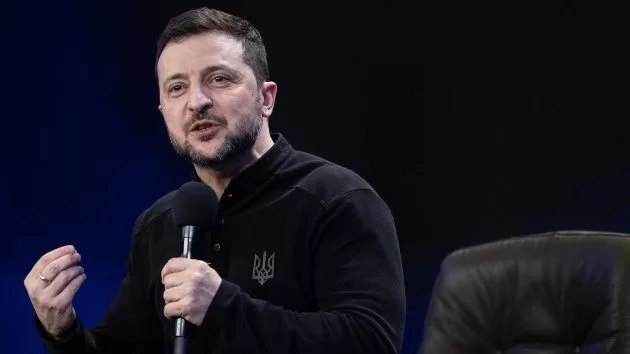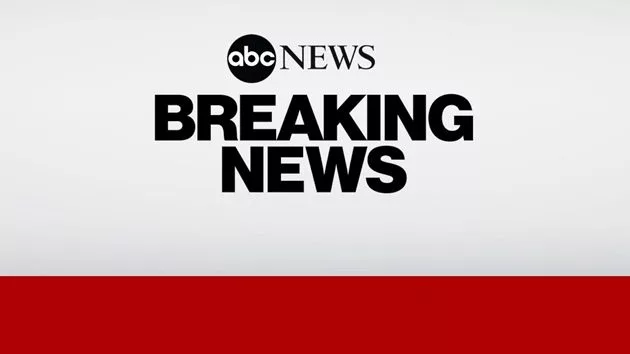
(LONDON) — Ukrainian President Volodymyr Zelenskyy and his leadership team spent much of 2024 cautiously courting both sides of America’s widening political divide — well aware that repelling Russia’s ongoing invasion relied, in large part, on U.S. largesse.
Kyiv appeared hopeful it could weather President Donald Trump’s dramatic return to the White House, assuring itself and the world that his campaign trail alignment with Russia’s narrative would be tempered by the geopolitical realities of the world’s most powerful office.
But the first month of Trump’s second term has already delivered a radical American pivot. The opening of U.S.-Russia talks in Saudi Arabia — intended to secure peace in Ukraine, but conducted without Kyiv’s involvement — and subsequent fraying of U.S.-Ukrainian ties, poses a new crisis for a nation that has grown used to living with existential peril.
Volodymyr Fesenko, a political scientist and the СEO of the Center for Political Studies “Penta” in Kyiv, told ABC News that recent developments represent “the most acute crisis in relations between the U.S. and Ukraine in their entire history.”
“In the worst case, this is a strategic turn of the U.S. towards Russia, rapprochement with Putin and weakening — or even the destruction — of previous partnership relations with Europe and Ukraine,” Fesenko said. “I am afraid that this is the scenario that will gradually be realized.”
“With Trump’s businesslike approach to bilateral relations, and with his interest in restoring relations with Russia, the previous special partnership relations between the U.S. and Ukraine will no longer exist,” Fesenko said.
Former President Joe Biden’s commitment to involving Kyiv in any talks to end the war was embodied by the “nothing about Ukraine without Ukraine” motto. That approach appears to have been replaced with Trumpian transactionalism.
The White House now appears to be strongarming Kyiv into economic, territorial and political concessions, with Trump himself berating Zelenskyy — celebrated by many Americans for his stoic wartime stewardship — as a “dictator without elections” who “better move fast or he is not going to have a country left.”
Zelenskyy and his top officials have pushed back, noting that Ukraine is unable to hold new elections while under martial law. Kyiv has said it is happy to work with the new administration on mutually beneficial economic and security deals, while urging American partners to treat Moscow’s narrative with skepticism. Ukraine’s parliament on Tuesday voted to affirm Zelenskyy’s legitimacy and agree that no elections can be held while the war continues.
The situation is “beyond disturbing” for Kyiv, a source close to the Ukrainian government told ABC News. “It’s hard to imagine that it can be pulled back.”
Ukraine’s leadership is trying to chart a course through the minefield of Trump’s second term, the source added.
“They feel that they’re striking this balance of not being impolite or disrespectful when it comes to countering some of the things that, again, at the end of the day, no Ukrainian leader can accept,” the source said.
“They feel that they’re managing it well, which doesn’t mean that they don’t have anxiety,” they added. “They do, because it is a fact that they rely on U.S. support, it is a fact that Europe cannot totally compensate for that support.”
“They’re striking this balance of pushing back, but not in a way where they’re coming off as totally obstructionist and obstinate,” the source continued.
This month’s historic U.S.-Russia meeting in Riyadh laid bare the new administration’s approach to Moscow. The two sides agreed to normalize diplomatic relations and continue talks aimed at ending Russia’s war, all without Ukraine’s involvement.
Meanwhile, Trump’s bid to win access to hundreds of billions of dollars worth of Ukrainian mineral resources further unsettled Kyiv. “We’re going to get our money back,” the president said of the would-be deal, the first draft of which Zelenskyy rejected, declaring, “I can’t sell our state.”
But after a week of intense negotiations, both sides now suggest they have all but reached a deal, with Trump saying Monday he expects to see Zelenskyy in Washington next week.
The reversal of the U.S. approach is striking. Where once Biden and his team refused to engage with Moscow outside of an unprecedented sanctions campaign, Trump and his top officials are now lauding a revival in bilateral ties.
Where Biden once led the “ironclad” commitment to defending Ukraine against Kremlin aggression “for as long as it takes,” Trump falsely suggested Ukraine “should have never started” the war.
The Biden administration’s steady flow of vital military and economic aid, meanwhile, has been replaced with Trump’s push to recoup what he sees as poorly invested American money. “I want them to give us something for all of the money that we put up,” Trump told CPAC on Saturday.
The president has focused in on the value of American aid to Kyiv, which he claims is as high as $500 billion. Zelenskyy disputed the figure and said American aid was given as grants, not loans. The Kiel Institute for the World Economy — a research institute in Germany that tracks foreign aid to Ukraine — said the U.S. has contributed around $119 billion to Ukraine over three years of war. The majority — $67 billion — was in the form of military equipment.
America’s rising Ukraine-skepticism is being expressed on all fronts. In an extraordinary illustration of the re-alignment on Ukraine, the U.S. sided with Russia in a vote against a United Nations General Assembly resolution condemning Russia, which passed on Monday with the support of the U.S.’ traditional Western allies. The UN Security Council passed a U.S.-drafted resolution which called for an end to the conflict without criticizing Russia. France and the U.K. abstained on the UNSC vote.
Zelenskyy has said Ukraine will not agree to any peace deal that does not protect it against renewed Russian aggression. The Trump administration’s rapid policy shift has pushed European allies to mobilize to provide their own long-term support — and protection — of Ukraine. Britain, France and others are discussing deploying European troops to Ukraine to guard any peace deal.
Though financially and logistically dependent on foreign partners, Ukraine’s armed forces are among the world’s most potent and experienced. Zelenskyy said in January that 980,000 Ukrainians are now under arms, dwarfing any other European military.
Despite Trump’s unproven claims to the contrary, well-respected polling organizations in Ukraine have found that Zelenskyy retains the trust of the majority of Ukrainians. His compatriots want the war to end on what they consider fair terms, but a December survey by the Kyiv International Institute of Sociology poll indicates that 57% are prepared to carry the conflict’s burden for as long as necessary, despite heavy casualties, ongoing attacks on infrastructure and severe economic strain.
There are more testing days to come. Moscow has said that the U.S. and Russian negotiating teams will meet for a second round of talks within the next two weeks.
“It should not look like Americans and Russians are trying to reach a deal about Ukraine’s fate behind our backs,” Oleksandr Merezhko, a member of the Ukrainian parliament representing Zelenskyy’s party, told ABC News.
“But what is really important for us is that such communication between Americans and Russians should not lead to the decisions concerning Ukraine,” said Merezhko, who is also the chair of the parliament’s foreign affairs committee.
“I hope that it might be a part of a political game on the part of Trump, who is trying to lure Putin into negotiations to demonstrate to his voters that he is at least trying to deliver on his promise,” Merezhko added.
“That’s why we need constant communication with Trump and his team — if there is a vacuum, it can be filled by pro-Russian narratives.”
Yuriy Boyechko, the founder and CEO of the Hope for Ukraine charity, told ABC News he believes Trump “is taking a side of the aggressor.”
“Ukrainians won’t sign a surrender,” he added. “We will keep on fighting to preserve a free and democratic Ukraine even if our top ally — the U.S. — walks away. We have no other choice.”
ABC News’ Patrick Reevell contributed to this report.
Copyright © 2025, ABC Audio. All rights reserved.



